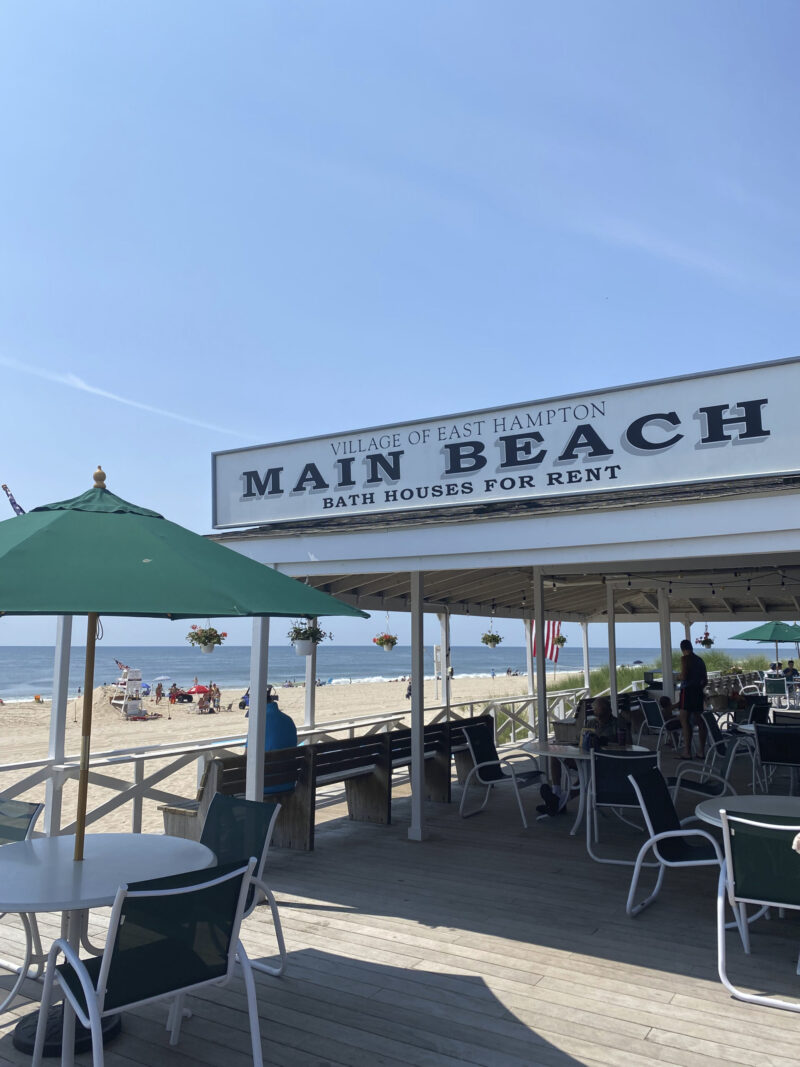
East Hampton Village last week formally gave the operators of the Beach Hut restaurant in the Main Beach pavilion permission to sell beer and wine for the first time during the 2022 summer season.
The approval, which came after a protracted discussion and the allaying of some concerns by the village’s police chief and members of the Village Board, will allow the Beach Hut to sell beer or wine from noon to 8 p.m. daily, but only with orders of food, and only for consumption on a specific portion of the pavilion’s porch that is assigned to the restaurant’s customers.
Beer and wine and other alcoholic beverages will still be prohibited on the sand during the hours when the beach’s lifeguards are on duty.
The Beach Hut’s operators, Susan and Amanda Seekamp, also will employ a strict tracking system of all sales of beer and wine, utilizing an app that confirms the validity of any identification shown, logs the names of all of those who purchase alcohol, and records each such transaction on video.
East Hampton Village Police Chief Michael Tracey said that the precautions and other assurances from the operators and village officials had settled some of the fears about problems that the sale of alcoholic beverages might lead to.
“As most of you know, I was the lone holdout at the public meeting — I was the ‘I wouldn’t do that if I were you,’” Chief Tracey recalled on Friday, April 22, referring to the board’s last discussion of the proposal in November, when the Seekamps first pitched the idea to the Village Board. “I was told to get everyone together, the operators, the beach manager, and we all aired our concerns.”
The chief said that the Seekamps have applied to the New York State Liquor Authority for an “on-premises” beer and wine license — their application to the state is still pending — which does not allow them to sell any alcoholic beverages for consumption outside of their designated establishment. “That does not include the beach,” the chief said, “I’m glad that’s the way it is.”
There will also be no glass containers, there will be no bar, there will be no sale of alcohol unless with “a meal,” and the aforementioned identification and tracking system will be implemented, the chief said.
Beach Hut customers who purchase beer or wine with their food must eat at one of the tables on the pavilion’s covered porch, which the Village Board said would be designated for the food stand’s use this summer. Tables elsewhere on the deck, which have folding umbrellas, will be set aside for use by others, and no alcohol may be consumed at them.
After reaching the mutual agreement on the various safeguards and delineations, Tracey said his previous concerns were allayed and on Friday he voiced support for the proposal.
Drew Smith, the village’s beach manager, said that he had been in contact with Southampton Village, which began allowing the sale of beer and wine at the Coopers Beach pavilion two years ago.
“They have not had any issues with [calls to police] or the lifeguards having issues with an unruly beach patron or excessive rescues because of intoxicated swimmers,” Smith said. “I don’t see this being an issue.”
Village Trustee Arthur Graham initially bristled at the approval resolution being dropped onto the agenda for Friday’s meeting without further discussion since the November meeting, even though he admitted he supported the idea. He also said he worried about liability for the village and said that the board should consider asking the Seekamps to pay more in rent. But he voted with the other four board members to approve the proposal.
Mayor Jerry Larsen, whose administration has advanced a decidedly pro-business approach to village policy, echoed the sentiment. He also dismissed concerns he said he has heard from some in the community that the sale of booze will have a seedy impact on the bucolic beach scene at Main Beach as “nonsense.”
“This is a minor, minor thing in the scheme of everything,” he said. “The safeguards are in place. It’s not going to be anything that is going to get out of hand.”